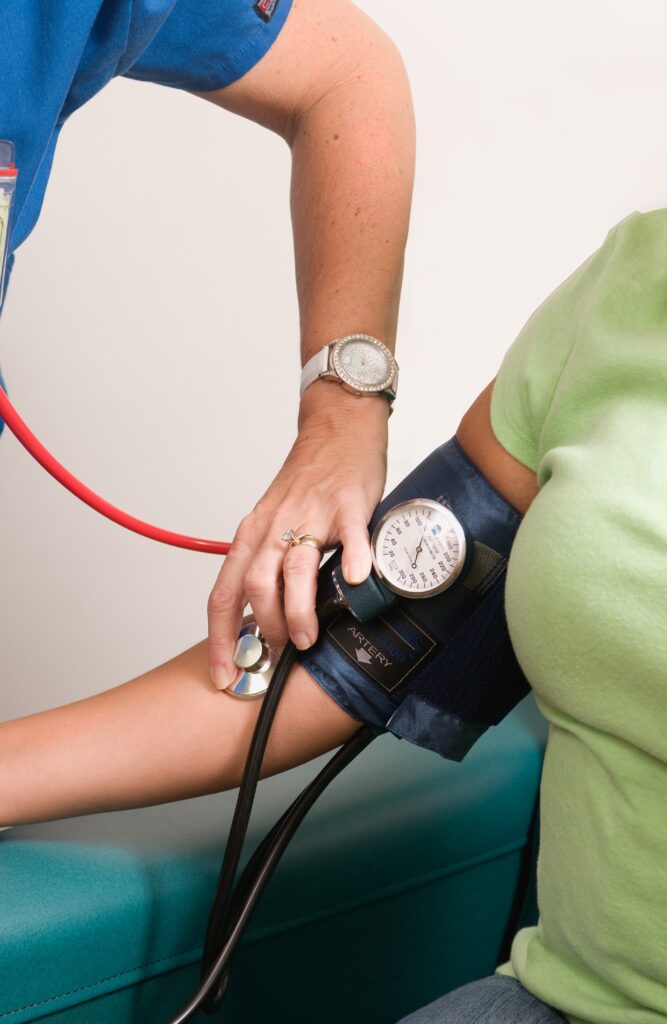High blood pressure, also known as hypertension, is a major risk factor for heart disease and stroke. While lifestyle changes can help lower your blood pressure, medications are often necessary to achieve normal readings. A healthy diet and regular exercise are two of the best ways to manage high blood pressure. Other lifestyle factors—such as stress management and alcohol consumption—can also help lower your risk for developing high blood pressure.

Get your weight under control.
One of the most important things you can do to manage your blood pressure is get your weight under control. Being overweight or obese increases your risk for high blood pressure, and losing even a small amount of weight can help reduce it.
If you’re overweight, start by cutting out excess calories from sugary drinks and other junk food. Then start eating more whole grains, fruits and vegetables instead of processed foods full of sugar and salt–and try exercising more often as well! If these changes don’t work on their own (which they probably won’t), ask your doctor about taking medication that helps lower blood pressure levels like diuretics (water pills). If these still aren’t enough then talk with them about cutting back on salt intake altogether by avoiding fast food restaurants as much as possible
Eat a heart-healthy diet.
You can reduce your risk of hypertension by eating a heart-healthy diet. A diet that’s rich in fruits and vegetables, low in sodium (salt), and full of low-fat dairy products is best for you. Choose whole grains instead of processed foods, and limit red meat while eating fish and poultry instead. The Dietary Guidelines for Americans 2015-2020 recommend:
- Eat at least 2 cups per day of fruits such as apples or apricots; berries; melons; oranges; peaches; pears; plums; grapes
- Eat at least 3 cups per week of vegetables such as kale/collards/turnip greens
Reduce stress.
You may be able to manage your blood pressure by reducing stress. Stress can be managed by eating healthy, getting enough sleep and exercising regularly. Meditation and yoga are good ways to reduce stress because they help you relax and calm down.
Other things you can do include:
- Taking deep breaths when you’re feeling stressed out;
- Going for a walk in nature if possible;
- Practicing self-care (taking time out for yourself);
- Avoiding negative people or situations that cause you more stress than necessary.
Maintain a healthy lifestyle.
- Maintain a healthy lifestyle:
- Don’t smoke.
- Don’t drink too much alcohol.
- Get enough sleep, at least 7 hours per night for adults and 8 to 10 hours for children and teens. Sleep deprivation can elevate blood pressure, so make sure you’re getting enough rest each night!
- Get regular exercise (at least 30 minutes daily), preferably in the morning before breakfast or on an empty stomach; this helps lower blood pressure naturally without medication by releasing chemicals into our bodies that relax us and reduce stress levels while also reducing body fat which contributes to high blood pressure by increasing body mass index (BMI).
Know your numbers.
Knowing your blood pressure and cholesterol levels is important for managing your health. You can get a blood pressure monitor at a pharmacy or online, or you may be able to get one for free from some pharmacies.
Eat healthy.
- Eat a balanced diet. A healthy, well-balanced diet can help you manage your blood pressure. It’s important to eat plenty of fruits and vegetables, as well as grains, such as whole wheat flour or brown rice. You should also choose low-fat dairy products instead of high-fat ones like butter or margarine; limit salt intake; avoid saturated fats (found in fatty meats); limit sugar intake to no more than 10% of your daily calories (about 6 teaspoons per day for most adults); increase fish intake if possible–it helps decrease risk factors associated with heart disease; drink plenty of water so that you’re well hydrated throughout the day
Exercise regularly.
It’s not just the physical benefits of exercise that can help you manage your blood pressure, but also the psychological ones. A 2012 study found that people who exercised regularly had better mental health than those who didn’t–and that includes lower rates of depression and anxiety.
Exercise also helps reduce stress levels, which can help lower your blood pressure in turn. And while it might be hard to imagine how running on a treadmill could make you feel happier, studies show that working out regularly will actually increase your levels of serotonin (the neurotransmitter responsible for feelings of well-being and happiness). In one study published in PLOS One, researchers found that people who did moderate intensity aerobic exercise three times per week experienced increased serotonin production compared with those who didn’t work out at all or did low intensity exercises only once every two weeks.
Manage stress.
Stress can be a major contributor to high blood pressure. The good news is that stress management techniques are simple, inexpensive and effective. They include:
- Meditation
- Yoga
- Regular exercise (such as brisk walking) and deep breathing exercises such as pranayama or alternate nostril breathing
Maintain a healthy weight.
Maintaining a healthy weight is an important part of managing high blood pressure. If you are overweight or obese, losing even 5% to 10% of your current weight can reduce your risk of developing high blood pressure by an average of 2%. In addition to helping lower your blood pressure, maintaining a healthy diet and being physically active can lower the risk for other diseases such as diabetes and heart disease.
Monitor alcohol consumption.
If you have blood pressure, it’s important to monitor your alcohol consumption. Drinking too much can increase your risk of heart disease and stroke.
If you’re currently drinking alcohol, limit yourself to one drink per day for women and two drinks per day for men (a standard drink is 12 ounces of beer, 5 ounces of wine or 1 1/2 ounce shot). If you don’t currently drink at all or rarely do so, stay away from it altogether–it’s not worth the risk!
High blood pressure can be managed with lifestyle changes and medications
High blood pressure can be managed with lifestyle changes and medications. Lifestyle changes include eating a healthy diet, being physically active, not smoking and monitoring your weight. However, if these measures do not lower you blood pressure enough or if they are not practical for you to follow on a long-term basis (e.g., due to cost or inconvenience), then medication may be recommended by your doctor.

Medications used to treat high blood pressure include beta blockers (e.g., metoprolol), calcium channel blockers (e.g., nifedipine), diuretics (water pills) such as hydrochlorothiazide and spironolactone; ACE inhibitors like lisinopril; angiotensin receptor blockers like telmisartan/valsartan combinations; renin inhibitors like aliskiren
Conclusion
The good news is that there are many things you can do to lower your blood pressure. And the best part is they don’t require any special equipment–just some changes in how you live life. Start by getting your weight under control and eating healthy food. Exercise regularly, manage stress, monitor alcohol consumption and get regular checkups from your doctor to keep track of all these factors together!